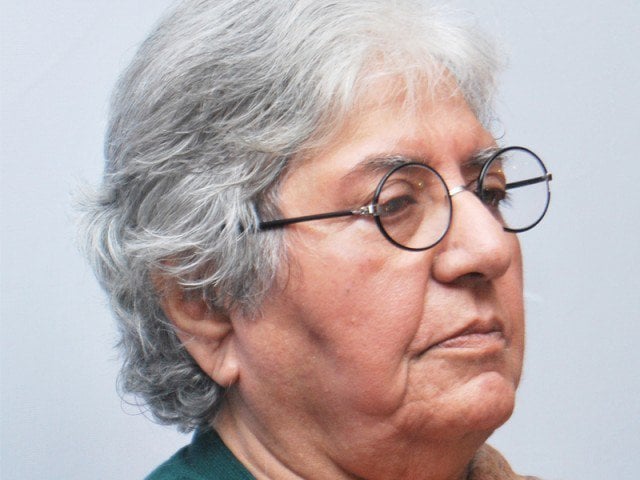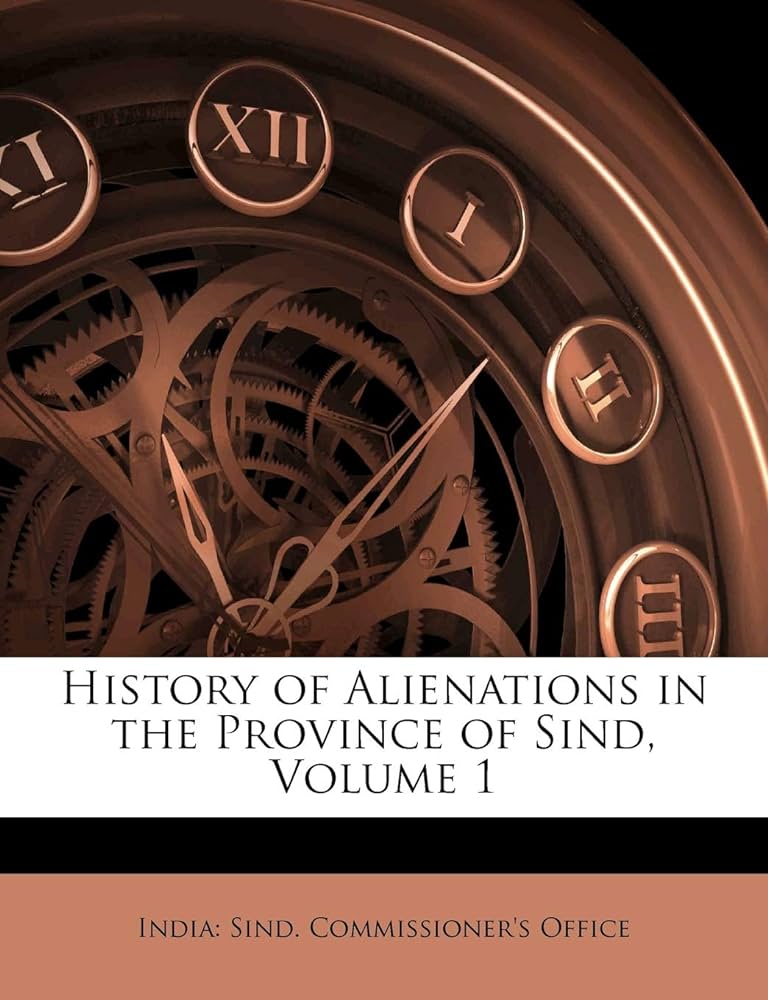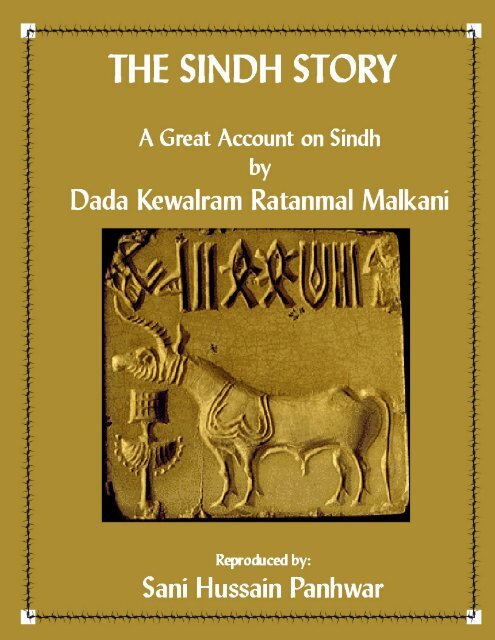
Jagirdari class in Sindh was formed during the time of the Kalhora and Talpur Mir rulers – Dr. Hamida Khuhro
[Translator’s note: This is a translation of renowned historian Dr. Hamida Khuhro’s comprehensive interview, originally published in the Sindhi magazine Nao Niapo, Karachi in May, 1986. The interview panel consisted of Advocate Masood Noorani, Journalist Nasir Aijaz and Faqir Muhammad Lashari, with Mansoor Qadir Junjo’s assistance to the interviewers. Masood Noorani also contributed observation notes from his initial meeting with Dr. Khuhro, which were used as a preamble to the interview. The interview was later included in an anthology that contained interviews of Dr. Khuhro, published in various Sindhi newspapers and magazines.
In 2021, Dr. Hamida Khuhro Foundation, Sindh (Karachi-Hyderabad) published Nao Napo magazine’s interview as a separate booklet with a title of ‘Tareekh Ji Amhon Samhon’ (Face-to-Face with History). The booklet includes a preface by Mansoor Qadir Junejo. Zaffar Junejo]
FM: Punjab and …. Salaried class played a significant role in initiating the Pakistan Movement. However, over time, their influence weakened, and it was absorbed into the fold of the feudal class. Similarly, Sindh’s landed class also supported the movement. There were various reasons and background factors behind this, but one commonly traded assumption was that Hindus were more advanced in trade and other areas, and most jobs and trade were concentrated in their lands. Even the feudal class loosened its grip and mortgaged their lands, which led them to support the Muslim League. This assumption likely influenced their decision. This is my opinion on the matter.
HK: Your explanation is partial. As I mentioned earlier, the arrival of the English people dismantled the old system, as I have already discussed in my writings. I have provided the context that the Jagirdari class in Sindh was formed during the time of the Kalhoras and Talpur Mirs. Additionally, we must not forget that there were reasons and logic behind the establishment of the Jagirdari class. One important condition for them was the supply of men during times of war; they had to fight for the king or the people in power. However, after the arrival of the English, they retained some Jagirs while abolishing others, primarily for political gains. They allowed vast lands in Ghaibi Dero area, but failed to provide us with a full alternative system. In those times, law and order was a serious issue. Therefore, the Zamindar or Wadero was made responsible for maintaining law and order in his vicinity. These landlords were obligated to meet twice a year and address issues of thefts and dacoities. They kept a close watch on their surroundings. Nowadays, such a tradition is dead, and it is difficult to determine who is virtuous and who has a questionable character, making it challenging to maintain law and order. Until the crippled old system is completely replaced by a new one, we will continue to experience uncertainty and frustration. Historical records offer numerous examples of such situations.
 After the arrival of the English, they retained some Jagirs while abolishing others, primarily for political gains.
After the arrival of the English, they retained some Jagirs while abolishing others, primarily for political gains.
MN: I believe that the Jagirdari or Zamindari system has caused significant damage to Sindhi society. They have instigated and played a role in creating divisions among Sindhis, leading to the destruction and defeat we witness today. This class has been involved in these negative outcomes.
HK: Which defeat are you referring to?
MN: I mean the overall sense of defeat.
KH: Inquisitively, defeat?
MN: I mean that until now, we are still slaves to outsiders.
FM: Allow me to elaborate. Sir Charles would sit in a tent and summon the landlords for salami (submission). Those who came and bowed down had their lands retained.
HK: It didn’t happen in that way.
MN: You have also stated in your book, “Making of Modern Sindh,” which is based on your PhD thesis, that Charles Napier encouraged the Jagirdars and asked them to bow and submit.
HK: Look, first Charles Napier invited people who possessed large chunks of land. However, it soon became evident that if their lands were retained, there would be no revenue collection, and the Jagirdars would take all the revenue. Therefore, they had to analyze who should be retained as a Jagirdar and who should be dismissed. They categorized them into those who were retained and those who were dismissed. There is a book by Dayaram Gidumal that discussed this topic, and it is in two volumes. One of the main factors for retaining the Jagirdars was to gain their support for governance. That is s why the Jagirdari system continued, and why its remnants still exist today. In our political discourse, we should also take into account our geography and see where we stand. Even if we look at the Sindh-Baluchistan border, tribal systems and communal traditions still prevail. Over time, human settlements were established, and the term Wadero (village elder) emerged, which referred to the leader of a specific community or village. Additionally, we must not forget that in the English period, it refers to Jagirdari. In contrast, in Europe, there were feudal systems where land and titles were held conditionally by the King’s vassals. Their primary duty was to provide an army to the king, and as a result, they were delegated certain powers. For example, people living or serving on their lands were not allowed to migrate, and they were also obliged to pay various taxes. However, as a historian, I cannot accept the idea that such medieval European feudalism still exists. Let me also add that even the Zamindari system has become orthodox and outdated and is on the verge of extinction. I also believe that the Zamindari system, established by the English, is not capable of sustaining itself or adapting to modern times. It should also be noted that the English not only abolished Jagirdari but also discontinued the tradition of granting land to Madrasas (Seminaries). They also implemented measures to ensure that Syeds cultivated the land themselves and became farmers. Therefore, we can say that during the early period of English rule, numerous experiments were conducted.
NA: (Looks at his friends MN and FML) May I explain my friends’ point of view? They wanted to say that whatever Sindh has suffered or whatever decisions have been made regarding its future, or even in the exploitation of Sindhi people, the Sindhi Waderos, Jagirdars, and landed class have aligned themselves with outsiders and exploiters.
MN: It could be explained further that among the upper class, except for a few cases, the majority, even during Raja Dahir’s era, including Brahmins and religious leaders, have supported outsiders and betrayed their motherland. Their role continues to this day.
HK: As a historian, I disagree with your interpretation. I say this because the primary cause of the collapse of any system lies within its internal contradictions and weaknesses. This was also true during Raja Dahir’s era when the majority of people were Buddhists, and Brahmanism also sought to survive. Even in the entire subcontinent, apart from Ashoka’s epoch, most parts were influenced by Buddhism, but Hinduism also tried to survive and attempted to spread itself. We agree that Chach and Raja Dahir are our heroes, but in their own context, they were Brahmins among Buddhist people. It was a harsh reality. If you study history, you will find that all revolts against them were initiated from Buddhist cities, and Buddhists often welcomed invaders. The explanation of these historical realities is very complex. Currently, the landed class is on the verge of extinction, and therefore, its grip has weakened. In modern times, they will not be able to play the same role they did before.
 MN: Sorry for the interruption, but you mentioned that the landed class is finished. However, even in the present government, which is led by a dictator, there is support from landlords. Contrary to your statement, the landlord class still exists. During Bhutto’s government, his land reforms were not able to completely eliminate the landlords. They were able to save their land through fraudulent means and some lands were transferred to their loyal tenants. I can even mention some influential landlords who are supporters and allies of the present government.
MN: Sorry for the interruption, but you mentioned that the landed class is finished. However, even in the present government, which is led by a dictator, there is support from landlords. Contrary to your statement, the landlord class still exists. During Bhutto’s government, his land reforms were not able to completely eliminate the landlords. They were able to save their land through fraudulent means and some lands were transferred to their loyal tenants. I can even mention some influential landlords who are supporters and allies of the present government.
HK: Regarding this matter, Bhutto Sahib was actually supported by landlords, and he also strengthened their position. In fact, this class has remained influential and continues to support General Zia. Looking back, they have supported the Muslim League and were also supporters of the Indian National Congress. While you mentioned that the Muslim League was supported by fundamentalists and opposed the Congress, it is important to consider the different reasons and ground realities. One significant factor was the dominance of Hindus in the bureaucracy, which made Muslims less inclined to support the Congress. Additionally, earlier capitalists were predominantly Hindu, and Muslims were burdened with loans. I differ from your point of view that is framed due to present role of the Muslim League. In those times, the oppressed people supported the Muslim League because it claimed to address issues of majority. The rural population did not have access to much-needed facilities, while all essential services were available in cities. Furthermore, the Hindus had wealth, owned newspapers, and utilized modern tools and techniques. In reality, rural areas were exploited by urban dwellers. These factors contributed to the success and popularity of the Muslim League.
FM: Another question arises regarding the British period. Were Hindus not allowed to possess land during that time?
HK: How could they not be allowed? Just read Naomal’s book or refer to PK Shahani’s decision. The Shahanis, who have had their lands in the Badin area for centuries and were referred to as the treasurers of the Mirs. It is misconception that Hindus were not allowed to own land.
FM: What about after the English period?
HK: (She interrupted) After the English period, Hindus had financial resources and sensibly utilized them to purchase land. During those times, land could be seized due to non-payment of loans, and it was often Muslims who were the borrowers and faced land loss. I have thoroughly studied the English era, and I couldn’t find a single piece of evidence that Hindus were not allowed to possess land. However, Charles Napier did introduce a new land revenue system and conducted experiments. One of his experiments involved the Dewans of Dadu, with Chando Ram being the protagonist, and he also acquired lands. There are many more examples I could cite.
FM: In KR Malkani’s book, ‘The Sindh Story,’ it is mentioned that if Naomal had refrained from betraying Sindh, Hindus might still be riding on donkeys.
HK: (She chuckled) It is important to approach such stories with a critical mindset and consider the related historical context. Let’s consider the character of Diwan Gidumal, who was so powerful and influential that one of the Indus ports was named after him – Giddu Bandar. He was even entrusted by Ghulam Shah Kalhoro to select a site for a new city, make the necessary arrangements, and commence its construction. In Hyderabad, Gidwani Street was quite popular. During those times, these people were referred to as Munishis. Honestly, the idea of Hindus riding on donkeys would not even arise. (Continues)
Click here for Part-I and Part-II (Preamble) – Part-!II , Part-IV
______________
 Dr. Zaffar Junejo is a historian and a writer, having earned Doctorate from the Department of History University of Malaya, Malaysia. Presently, Mr. Junejo is associated with the European University Institute, Florence, Italy. Apart from scholarly contribution, he also writes for popular media. He could be accessed at: Email junejozi@gmail.com, Cell/WhatsApp +92 334 045 5333 Skype Zaffar.Junejo Facebook facebook.com/zaffar.junejo
Dr. Zaffar Junejo is a historian and a writer, having earned Doctorate from the Department of History University of Malaya, Malaysia. Presently, Mr. Junejo is associated with the European University Institute, Florence, Italy. Apart from scholarly contribution, he also writes for popular media. He could be accessed at: Email junejozi@gmail.com, Cell/WhatsApp +92 334 045 5333 Skype Zaffar.Junejo Facebook facebook.com/zaffar.junejo